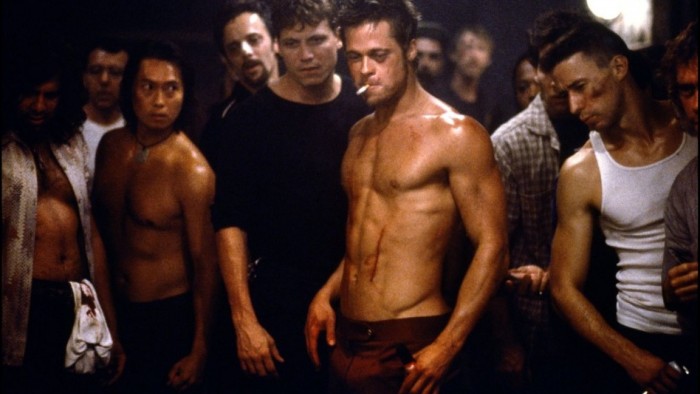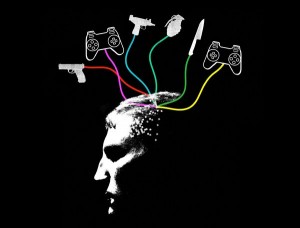
I have always thought that fighting does not solve anything, but exacerbates existing problems between two parties. With that in mind, I would not classify myself as non-confrontational, as I neither fear asserting my opinion nor do I fear having to swing my fists. Despite this belief, I got into a fight with a former friend (I will call him Jack for the sake of this paper). Here’s a little background.

Shot from the movie Fight Club
http://www.theverge.com/2015/7/14/8965585/fight-club-rock-opera-david-fincher-trent-reznor
I met Jack at the very beginning of freshmen year in the dystopian utopia of Wake Forest. In all honesty, we actually hated each other when we first met. I came to the quick conclusion that Jack was a prick with an over-inflated ego. Jack thought that I was weird and that I tried way too hard. Despite these preconceived notions of one another, Jack and I lived quite close. As a matter of fact, Jack happened to live right next door to me in lovely Johnson Hall. So, due to some combination of god-awful living conditions and close proximity, we managed to form a tight friendship. We went out together. We ate together. We spotted each other cash. We pledged together. We hung out over the summer. You get the point.
Here’s how this completely unremarkable fight went down. It was a Saturday afternoon and, after returning from the gym, we were hanging out in Jack’s room. As usual, he started ripping on me on one of his original topics such as: Keith, you are weird, Keith, you talk to ugly girls, Keith, you get with ugly girls, Keith, you have a hot mom, Keith, you do not handle your liquor well, Keith, you need to lose weight, Keith, you are dressed stupidly. Jokes of this nature rarely phase me—I personally make self-deprecating jokes all the time—but on that day my blood started to boil. His jokes were not funny. They were not even jokes; they were insults. It was always a lose-lose with this kid. When we lifted and I would bench-press substantially more weight, he tried to correct my form. Whenever I made joke about him, he would become extremely upset. When I called him a dumbass while studying last semester, he practically ran out of the room crying. I digress. I was starting to get irritated but I remained calm. I happened to be sitting with Jack’s pillow between my legs, which caused him to threaten to “put his nuts” on my pillow. He began walking toward my room and that was when I had finally had it. I proceeded to put him in a double arm bar[1] and walked him back into his bedroom. He then told me to get out of his room. We have not talked since. As a result of my recent “fight,” I will attempt to analyze fighting from a scientific perspective to shed some light on a topic that gets less analysis than it deserves.
* * *
While fighting and aggression may seem synonymous, they are actually quite different. Aggression is a complex in animal species that consists of acts that are hostile. Yelling, beating one’s chest, fighting and many other actions fall under the categorical umbrella of aggression. We all have our moments of aggression; however, “In humans there are no consistent patterns of aggressive behaviors that make men have more luck with women or succeed over other men for status, even though sometimes aggression does play a role. Even when fighting, many of the most effective professionals (such as in boxing and ultimate fighting) are good because of their ability to strategically constrain their aggression” (Fuentes). Whether one makes a passive-aggressive remark or decides to shoot someone in the face, humans have aggressive tendencies. Despite these tendencies, reproduction has selected against aggression. According to Fuentes, that leaves humans with a slight genetic basis to commit acts of aggression with the acts of aggression having little social and reproductive benefit. Sports that allow one to exert aggression yet maintain a safe environment greatly relieve violent inclinations.
Personally, I agree with that assessment of combat-oriented sports. I wrestled competitively from ages six to fourteen. Wrestling was an awesome stress-reliever. If I had a bad day, I would channel all my negative energy into having a good practice. The sport strips one to his bare essentials. On the wrestling mat, the outside world fades into oblivion. The noise of the crowd fades into something ethereal; the sound is there but the wrestlers cannot hear it. A wrestler is too focused on the task in front of him. Hell, once on the mat, winning does not even matter; as long as you try your best you actually can have a transcendental experience—it is probably some combination of endorphins, adrenaline, and fatigue. A wrestling match is one of the few times when trying your best and losing still has some aspect of satisfaction. Most importantly, wrestling taught me a basic level of respect for engaging one in combat. One should never take a fight lightly. Fighting has rules. Your opponent deserves the same amount of respect as you do.
The question now arises, what causes violence? If humans are so preternaturally inclined to avoid aggression, why is there mass murder in the Middle East? Why do cops senselessly beat innocent civilians? Why do husbands beat their wives? Mounting evidence suggests that violence (which obviously includes fighting), much like racism, is a learned behavior. That does not necessarily mean a child learns violence from witnessing violence, but that raising a child a certain way can increase violent tendencies. For example, witnessing spousal abuse did increase a child’s tendency to commitment domestic violence later in life, but child neglect actually had the largest affect on spousal abuse out of any form of maltreatment (Bevan & Higgins, 17). So a lousy household greatly increases the chances of whether a child grows into an abusive adult or not. Oddly enough, neglect leads to a greater rate of spousal abuse than actual domestic violence. From a completely basic psychoanalytic standpoint, I would theorize that neglect causes some sort of emotional hole within the child’s psyche that places a desire for attention and respect. As an adult the former child commands respect and attention through a regular beating of his or her spouse.
In addition to maltreatment breeding aggressive behavior later in life, factors also exist that increase aggressive behavior. A common scapegoat diagnosed as the cause of all the school shootings, teen violence, and virtually every other problem takes shape in the form of violent video games. Naturally, this blind blame has sparked a large amount of research into whether or not violent video games can directly cause violence. Recently, research released by the APA has concluded that playing violent video games increases aggression during and directly after playing the game; however, evidence did not provide any clarity on whether or not this increased violent crime. So playing a video game may make you more inclined to yell at your siblings, but it does not necessarily mean that one will show up strapped to school the next day with the full intention of murdering everyone. For my purpose, this contributes to the fact that external factors do have a tangible impact on aggression and likely fighting. This also ameliorates the rhetorical questions asked in the previous paragraph.

Source: http://www.nytimes.com/2013/02/12/science/studying-the-effects-of-playing-violent-video-games.html
Even though certain video games possess violent content, an apparent gap exists as to whether or not the violence or competitive nature of these types of games drives an influx in aggression. In the realm of sports, both baseball and football cause similar spikes of aggression in athletes (Anderson & Carnegey, 6). Nevertheless, there appears to be very limited data that corroborates non-violent video games causing the same increase in aggression as violent video games (Anderson & Carnegey 6). However, this is only a singular study on a rather new field and a gap on information is apparent. An accurate way to potentially test the viability of such claims would be to test on a much larger scale. Who knows, maybe Mario could make somebody as angry as Call of Duty. From personal experience, I have seen my younger brother freak out at both of these video game franchises, all thought that could just be him.
* * *
With all that information regarding fighting, violent behavior, aggression and all that, I guess now is the time I should to go the generic confessional route and end this paper with some huge proclamation. I can talk about what I’ve learned since this nonsenses happened, how I’ve become a better person, or finish with an elegy about how I wish things went back to they way they had been. I will sincerely avoid trying to do any of that fictional fairy tale stuff, because not everyone draws the perfect conclusion in real life. Rather, I think I have found the proper course of action to take.
I refuse to finish writing acting like a victim of some great atrocity that happened. Fights, violence, and aggressive behavior are completely natural behaviors that continue to persist despite the great advances of language, technology, and civilization. Having a fight with a friend does not make me special in any way, shape, or form. Nevertheless, I do not condone fighting. We have literally reached a point of technological advancement in which we have portable devices that allow us to read great works of literature, look up directions to China, look at photos of food, all while simultaneously talking with your mother. We have the means to take a diplomatic approach to situations of any nature, but the primal tendency to be aggressive—to fight—can be so overwhelmingly powerful, that it engulfs us. Rage can sometimes flow straight from the head to the very peripherals of the human body, consuming every cell along the way. So do I regret fighting Jack? Not at all. He had it coming. Do I regret momentarily allowing hatred to consume myself? Absolutely. With all of the rapists, racists, murders, cults, ISIS, I do not need to lower myself and contribute to the sphere of hatred and violence. Cue the cliché: life is too short to spend it being angry. I will not live spitefully like my former friend. So Jack, if you know who you are and manage to read this, I forgive you, but by no means do I consider you my friend.
[1] A wrestling move where one runs both of his arms underneath the armpit of his opponent (facing backwards), clasping hands together at the back